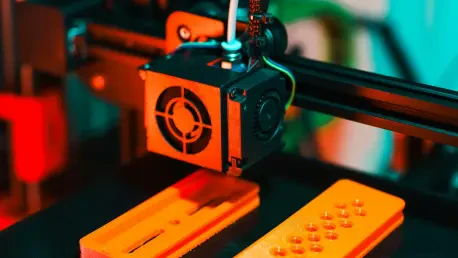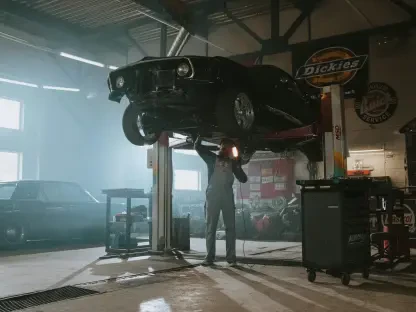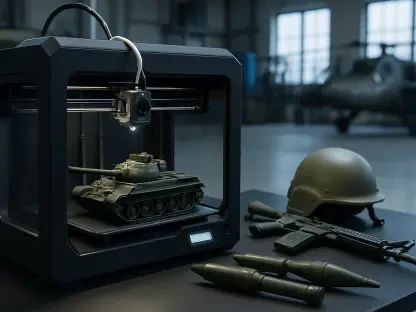Imagine a world where industrial giants can produce massive, customized components with the precision of a craftsman, slashing production times and costs while pushing the boundaries of innovation. This is the promise of additive manufacturing (AM), a sector revolutionizing how industries like aerospace and automotive approach production. As of 2025, the AM industry stands at a pivotal moment, with large-format technologies emerging as a game-changer for creating sizable parts. A recent strategic move by Caracol, an Italian leader in AM, underscores this shift, setting the stage for a deeper exploration of how acquisitions and partnerships are shaping the future of industrial manufacturing.
Overview of the Additive Manufacturing Industry
The additive manufacturing sector has solidified its role as a cornerstone of modern industrial applications, offering unparalleled flexibility in design and production. Often referred to as 3D printing, AM enables the creation of complex geometries that traditional methods struggle to achieve, making it indispensable in high-stakes fields like aerospace for lightweight components and automotive for rapid prototyping. With a global market expanding rapidly, the industry is driven by technological breakthroughs and a growing demand for sustainable manufacturing solutions.
A key segment within AM is large-format additive manufacturing, which focuses on producing oversized parts for heavy machinery and industrial equipment. Major players, including companies from Europe and North America, are investing heavily in robotic systems and advanced materials to push the limits of scale and precision. Innovations such as automated extrusion processes and hybrid manufacturing techniques are redefining capabilities, while the sector’s reach spans across continents, with strong hubs in regions like the DACH area (Germany, Austria, and Switzerland).
The relevance of AM continues to grow as industries face pressures to reduce waste and accelerate production cycles. In sectors like heavy machinery, the ability to print large, customized components on demand offers a competitive edge, minimizing downtime and inventory costs. As adoption increases, the industry is poised for further expansion, fueled by a blend of technological advancements and strategic collaborations that promise to address complex manufacturing challenges.
Strategic Acquisition: Caracol and Weber AM Partnership
Details of the Acquisition
On October 1, Caracol, based in Barlassina, Italy, finalized a significant acquisition of intellectual property and robotic machine configuration assets from the AM division of Hans Weber Maschinenfabrik GmbH, a German firm located in Kronach. This deal marks a pivotal step for Caracol in strengthening its foothold in large-format AM, a niche critical for crafting substantial industrial components. The acquisition not only enhances Caracol’s technological portfolio but also extends its geographic influence, particularly in the DACH region, known for its robust industrial base.
The partnership between these two entities reflects a calculated move toward global market expansion. For Caracol, integrating Weber’s assets means access to specialized knowledge in large-scale production setups, while Hans Weber Maschinenfabrik GmbH benefits from aligning with a market leader capable of scaling its innovations. The focus on large-format AM aligns with the growing need for efficient solutions in industries requiring oversized, high-precision parts.
This transaction also highlights the strategic importance of cross-border collaborations in the AM sector. By combining Italian and German expertise, the deal positions Caracol to cater to a broader client base with enhanced capabilities. The emphasis on producing sizable components underscores a shared vision to tackle some of the most pressing demands in modern manufacturing landscapes.
Synergies and Technological Advancements
A defining aspect of this acquisition lies in the mutual dedication to innovation and engineering excellence shared by Caracol and Weber AM. Both companies have built reputations for pushing technological boundaries, and their combined strengths promise to deliver cutting-edge solutions. Caracol’s expertise in turnkey technological ecosystems pairs seamlessly with Weber’s proficiency in extrusion processes and machinery manufacturing, creating a powerhouse of capabilities.
The integration of these skill sets is expected to elevate Caracol’s offerings, particularly through enhanced customization on its Heron platforms. Clients can now access advanced automation features, including Siemens control systems and ABB robots, which streamline production and improve precision for large-format applications. This synergy aims to address specific industrial challenges, ensuring that solutions are both scalable and tailored to unique requirements.
Beyond technical advancements, the partnership ensures continuity for existing Weber AM clients through Caracol’s global network, spanning over 55 countries. This commitment to sustained support reflects a customer-centric approach, blending the best of both firms’ philosophies. The result is a fortified technological roadmap that prioritizes innovation while maintaining reliability for users across diverse sectors.
Challenges in Scaling Large-Format AM Technologies
Scaling large-format AM technologies presents a host of challenges that industry players must navigate to achieve widespread adoption. Technological complexities, such as ensuring uniform material deposition over vast surfaces, often hinder efficiency and quality. Additionally, the high costs associated with developing and maintaining advanced robotic systems pose significant barriers, particularly for smaller firms looking to enter this space.
Market-driven issues further complicate the landscape, as client demands vary widely across industries, from aerospace’s need for lightweight structures to heavy machinery’s focus on durability. Developing scalable solutions that balance customization with cost-effectiveness remains a persistent hurdle. The integration of large-format AM into existing production workflows also requires substantial investment in training and infrastructure, slowing adoption rates.
To overcome these obstacles, strategic partnerships and acquisitions offer a viable path forward. Collaborations enable companies to pool resources, share expertise, and accelerate innovation, as seen in Caracol’s latest move. Investing in modular systems and standardized processes could further mitigate integration challenges, paving the way for broader acceptance of large-format AM in industrial settings over the coming years.
Regulatory and Compliance Landscape in AM
The regulatory framework governing additive manufacturing plays a critical role in shaping its development and deployment, especially for industrial applications. Standards related to material safety, process reliability, and end-product quality are stringent, ensuring that AM technologies meet the rigorous demands of sectors like aerospace and automotive. Navigating these regulations requires a deep understanding of both global and regional requirements.
In key markets such as the DACH region, compliance with local and European Union guidelines adds another layer of complexity to technology development. These standards often dictate specific testing protocols and certification processes, impacting timelines and costs for AM providers. Companies must remain agile to adapt to evolving policies while maintaining high safety and performance benchmarks for their solutions.
Caracol and Weber’s combined expertise offers a strategic advantage in addressing these regulatory challenges. With a shared focus on engineering precision and client support, the partnership is well-equipped to ensure compliance across markets. This capability not only facilitates smoother market entry but also builds trust with clients, reinforcing the duo’s commitment to delivering reliable, regulation-compliant AM technologies.
Future Outlook for Large-Format Additive Manufacturing
Looking ahead, large-format additive manufacturing is set to witness transformative growth, driven by emerging technologies and rising industrial demand. Innovations in materials, such as high-performance composites, are expanding the range of applications, while advancements in automation promise to enhance production speed and accuracy. From 2025 to 2027, the sector is expected to see significant investments in these areas, reshaping manufacturing paradigms.
Potential disruptors, including breakthroughs in hybrid AM systems and shifts toward customized, on-demand production, could redefine competitive dynamics. Consumer preferences are increasingly leaning toward bespoke solutions, pushing companies to prioritize flexibility in their offerings. This trend underscores the need for adaptive technologies capable of meeting diverse, evolving requirements in real time.
Strategic partnerships will remain a linchpin for driving growth and innovation in this space. Caracol’s expanded global presence through its acquisition of Weber AM assets serves as a prime example of how collaboration can amplify market reach and technological prowess. As industries continue to embrace large-format AM, such alliances will be instrumental in addressing scalability issues and unlocking new opportunities across global markets.
Final Thoughts
Reflecting on this pivotal development, Caracol’s acquisition of Weber AM assets marks a defining moment for large-format additive manufacturing. The partnership blends distinct strengths, setting a new standard for innovation and client support in the industry. It also highlights how strategic moves can effectively tackle technological and market challenges, paving the way for enhanced solutions.
Moving forward, the focus should center on leveraging such collaborations to drive scalability and adoption. Industry stakeholders are encouraged to invest in research for advanced materials and automation, ensuring that AM technologies remain at the forefront of industrial evolution. Building robust compliance frameworks will also be crucial to sustain trust and expand into regulated markets.
Lastly, fostering a culture of continuous improvement and cross-border partnerships can unlock untapped potential in this dynamic field. As the demand for customized, large-scale components grows, proactive steps toward integrating cutting-edge systems and sharing expertise will position companies to lead in a competitive landscape, shaping the next chapter of manufacturing excellence.









